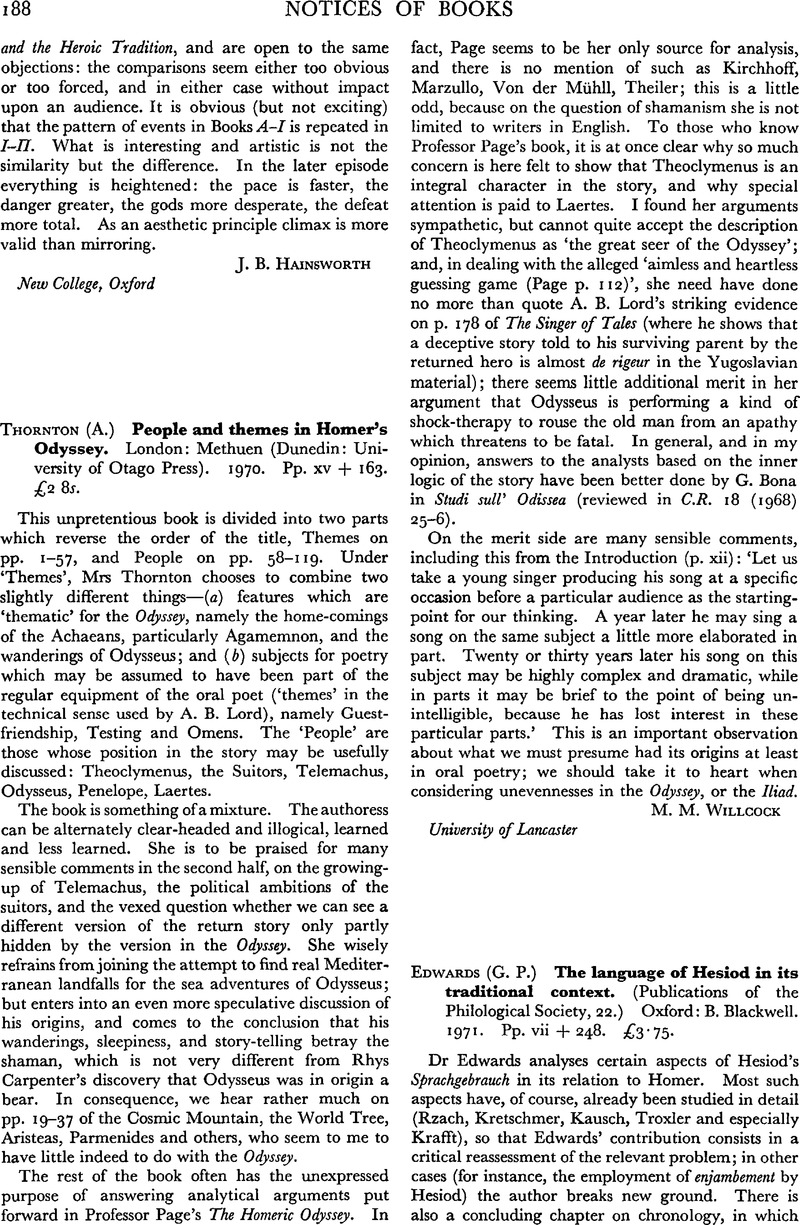No CrossRef data available.
Article contents
(G. P.) Edwards The language of Hesiod in its traditional context. (Publications of the Philological Society, 22.) Oxford: B. Blackwell. 1971. Pp. vii + 248. £3·75.
Published online by Cambridge University Press: 23 December 2013
Abstract

- Type
- Notices of Books
- Information
- Copyright
- Copyright © The Society for the Promotion of Hellenic Studies 1972
References
1 Arion 1967, pp. 279 ff. Cf. also K. H. Jackson (Professor of Celtic in the University of Edinburgh): ‘adherents of the Milman Parry theory would do well to note that there is not the slightest evidence for so-called “improvisation” in the well-known history of the oral poetic tradition in the Celtic literatures’ (The Gododdin, The Oldest Scottish Poem, Edinburgh, 1969, p. 60).
2 Except where the poet's memory has let him down, of course.
3 American Philol. Assoc. Paper, Cincinnati, 1971.
4 Cf. Krafft, , Vergl. Untersuch., p. 84 f.Google Scholar; p. 21 (‘bewusste Anspielung’).
5 ‘He not only borrowed without change from early Epic, but also practised all the arts of “interpretation”, “variation” which were to become so popular with the Hellenistic poets.’
6 Hom. Wört., e.g. p. 164 ‘Umdeutungen homerischer Wörter bereits aus der Zeit des Epos’;, and p. 344 f., s.v. ‘Bedeutungslehre’, ‘Umdeutungen’, ‘Bedeutung aus Stellendeutung’, etc.
7 Neuer, in der Sprache der hom. Hymnen, Diss. Zürich, 1955, PP. 43 ff.
8 In other words, it would be unwarranted to alter the text of Hesiod on the sole ground that λαρός normally has ā, in so far as Hesiod's employment of λᾶρός is—of all things!—a typical case of Homeric ‘Umdeutung’ (note that the sedes of the word ΛΑΡΟΣ is the same in Hesiod's line as in Od. 5. 51, and that in both lines the word is in the dative case and precedes a substantive). The ‘Umdeutung’ in question was prompted by the facts already indicated by me in Class. Rev., loc. cit., and of course also by the fact that oscillation between ᾶ and ā in adjectives was known to Hesiod (cf. Edwards p. 107: κᾰλός, καλός).
9 Cf. Leumann, op. cit., p. 164: ‘Umdeutungen homerischer Wörter’ are a ‘rein grammatisch’ process.
10 The analogy between Hesiod and Hellenistic epic poets in the employment of this feature has been well illustrated by Rzach, (Dial. Hes. p. 395 f.Google Scholar, Gramm. Stud. Apoll, p. 437 f.). For Antimachus cf. Hermes 1970, p. 263.
11 Cf. Hermes 1970, pp. 257 ff.
12 Cf. Hermes 1970, pp. 263 ff.
13 Accuracy requires me to refute the three ‘points of principle’ relating to Hesiod, which are mentioned by West in Class. Rev. 1970, p. 416, in connection with my unfavourable review of his edition of the fragments, (a) West asserts that his own private poetry, i.e. cases of supplementation where he has ‘filled out half a word into a complete hexameter’, is ‘a useful contribution to the study’ of Hesiod: I (and, as I pointed out in my review, all the papyrologists that I know of, from Lobel to Page) agree with Lloyd-Jones in believing that ‘the fanciful supplementation of fragmentary texts’ is ‘the main bore and nuisance for students of Greek poetry’ (Class. Rev. 1970, p. 296). (b) West maintains that Hesiod did not practise ‘imitatio cum variatione’. His assertion involves him in a crescendo of contradictions. He himself agrees with Krafft that Hesiod's poetry has the ‘laboured quality’ indicating ‘painful written rather than unencumbered oral creation’ (Theogony, p. 40): when faced with the cases of ‘imitatio cum variatione' brought to light by Krafft, however, West takes refuge in ungrounded dogmatism, and asserts that ‘formulae common to both [i.e. Homer and Hesiod] need not imply dependence', because ‘it is certain’ [sic] that Hesiod ‘never read’ the Iliad (Class. Rev. 1965, p. 159). Such a piece of dogmatism is not only unsubstantiated, but, worse still, contradicted by the evidence available: West is compelled to maintain that all the cases under discussion have arisen fortuitously, a contention which is no less grotesque than untenable (of. Edwards, pp. 36 f., 75). (c) West overtly admits that he is not acquainted with the presence of ‘Umdeutungen’ in early Epic: no wonder he disfigured fr. 315 of Hesiod!




